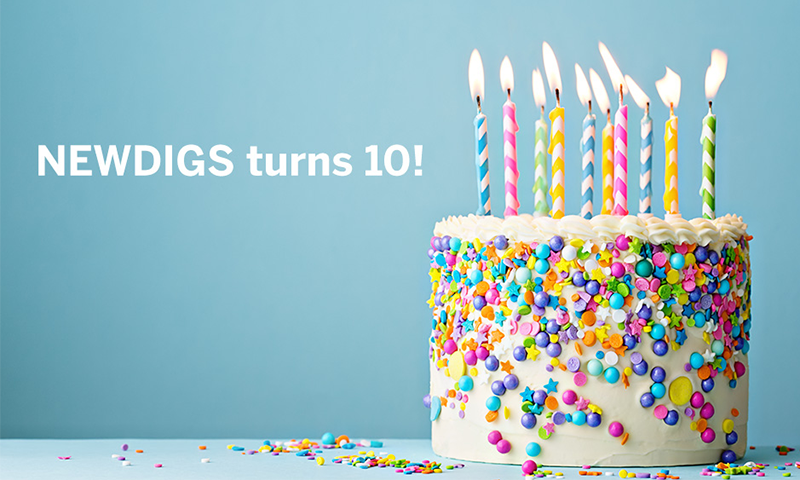Letter from Dr Gigi Hirsch
Executive Director, MIT Center for Biomedical Innovation and
Director, NEWDIGS
In 2009 an international working group of biomedical research and healthcare leaders gathered at MIT to grapple with the implications of unprecedented advances in science and increasing demands to control costs and improve quality. Would the evolving forces of value-based healthcare stifle innovation? Could we reorganize the system to innovate and demonstrate value and quality?
That working group became NEWDIGS. As we mark the 10th anniversary of that seminal work, our mission remains clear and urgent: to drive more value faster to patients, in ways that work for all stakeholders.
The solution is in the system
But where to start? We discovered our greatest potential for impact was in efforts to help the system catch up with the science. This kind of system evolution can’t be accomplished one player, one product at a time. It requires engaging industry, payers, regulators, patients and care providers in hands-on, data-driven, real world projects aimed at complex process innovations across the value chain. To enable this kind of collaboration NEWDIGS developed innovation methods and tools agnostic to disease area or geographic setting.
Project-specific collaboration communities tailor the application of these tools and methods to achieve value that is meaningful to their context. Outputs incorporate the coordinated evolution of processes, policies, technologies, and incentives—not quick fixes and “point” solutions. All of our initiatives cross traditional silos to better manage risk, reduce uncertainty, and enhance innovation value for patients and for the system.
One might think that large, diverse teams tackling complex problems would guarantee slow work and obscure impact. That is not the NEWDIGS way. Each project aims to advance from concept stage to real-world pilots in three years with “shovel-ready” plans rigorously vetted and co-designed by the partners who will implement them. Along the way: new open-source methods, tools, and insights are developed and disseminated for use by other innovation communities similarly dedicated to sustainable, patient-centered biomedical innovation.
Patient and policy impact
Our system-level innovations are beginning to have real-world impact on patients’ lives today. On June 3 of this year, the EMA awarded bluebird bio conditional approval to market its gene therapy for beta thalassemia, a blood disorder causing patients suffering from it to require lifelong blood transfusions every two to four weeks. NEWDIGS work on regulatory (Adaptive Licensing Project) and payer (FoCUS Project) policy innovations helped to pave the way for patients in need to receive this product earlier than would have previously been possible, with stakeholders working together differently to manage risks, and reduce uncertainties.
The FoCUS Project is gaining greater traction and visibility with the release of its Precision Financing Strategies: a collection of tools and techniques to make new durable, potentially curative therapies (which could pose high upfront costs but deliver clinical benefits over time) accessible to patients and sustainable by all system stakeholders. Now at the three-year mark of the project we are moving toward pilots, and engaging change-makers across the healthcare sector through conferences and workshops.
Next chapter: Transforming real world learning through Downstream Innovation
In a world of value-based healthcare, the scope of biomedical innovation extends beyond bench research and regulatory approval into the post market world of clinical care. Planning for impact—not just hoping for it—requires the active input of patients, providers, and payers much earlier in clinical development, and learning that continues from real world product use. So we’re building on our momentum with our most ambitious and cross-cutting project to date.
Leveraging our now proven collaboration methods and extensive consortium network, we’re turning our sights to the challenge of downstream innovation with the Learning Ecosystems Accelerator for Patient–Centered, Sustainable Innovation (LEAPS) Project. LEAPS aims to transform how we plan, produce, and use real world evidence for a target disease, to improve outcomes for patients, and to reduce waste and inefficiency for the system.
The time is right for LEAPS to help fuel our evolution from Big Data to smart evidence, one disease at a time. It aligns with 21st Century Cures’ prioritization of advancing RWE use in biopharma. It leverages exciting innovations in advanced data analytics, as well as platform strategies to gain efficiencies and scale from new learning infrastructures. And it incentivizes the sharing of real-world data that is critical for unlocking the knowledge vital to an urgent, shared need—getting the right treatments to the right patients at the right time. Our initial pilot will focus on Rheumatoid Arthritis, with Massachusetts serving as testbed environment, and we are on track to begin rolling out demonstration modules next year.
Why we’re succeeding—thanks to you
NEWDIGS has succeeded in framing, and fueling impact from downstream innovation for three reasons: we’re grounded in the deep technical expertise and analytical rigor of MIT; our processes, methods, and tools are designed to drive timely, real world change; and most crucially, we’ve had the unrelenting commitment of our ever-growing community of members who share a vision for transformative change. Our success would not have been possible without you—thank you.
Indeed, one of NEWDIGS’s greatest achievements is having built a community whose members trust one another enough to build the bridges we need to make the change society demands. I and my colleagues at MIT thank you for all of your many contributions to our collective success. We look forward to working side by side with you, harnessing the power of our community, to advance sustainable, patient-centered innovation in the next decade.
With warm regards,
Gigi
